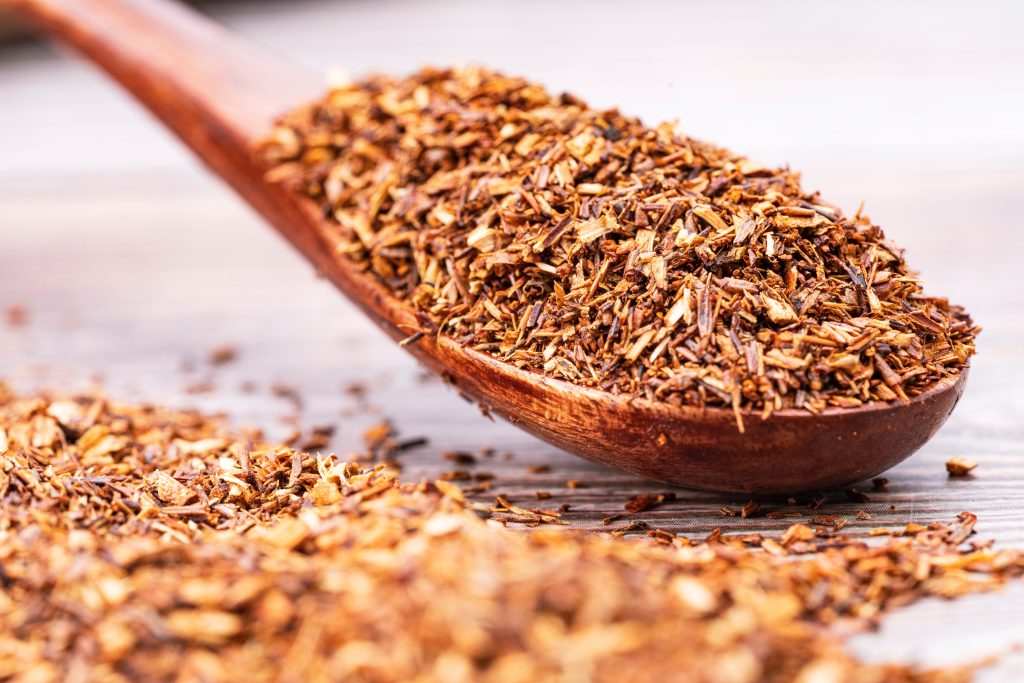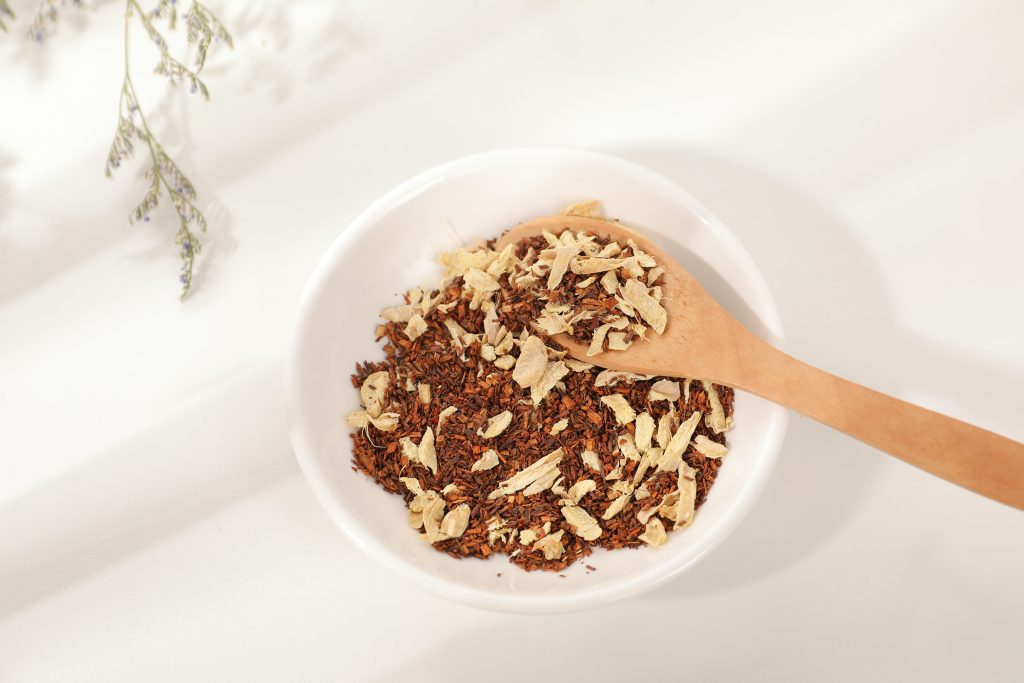Unlocking the Health Benefits of Rooibos Tea: A Comprehensive Guide
Are you a tea connoisseur searching for a type of tea that offers a blend of flavour and health benefits? Look no further than the red bush tea, more popularly known as Rooibos Tea. Also called African red tea, rooibos is a traditional herbal tea made from the Aspalathus linearis plant native to South Africa. Its unique fermentation process gives it a rich red color and distinguishes it from other teas. This South African tea is earning recognition worldwide, thanks to the numerous health benefits packed in every cup of Rooibos tea.

Photo by TeaCora Rooibos on Unsplash
What are the Health Benefits of Drinking Rooibos Tea?
Typically enjoyed hot with a hint of milk and sugar, the benefits of Rooibos tea go beyond its delightful taste. From heart health to balancing blood sugar levels, there’s no shortage of reasons to drink Rooibos tea.
Antioxidants rooibos tea are known to help reduce the risk of cardiovascular disease by supporting healthy blood pressure and promoting the relaxation of blood vessels, which can improve circulation and overall heart health.
Boosting Heart Health with Rooibos Tea
One of the primary health benefits of Rooibos tea is in the area of heart health. Rooibos tea may also help lower or manage high blood pressure, which is a key factor in maintaining cardiovascular health. Drinking Rooibos tea daily could benefit individuals with high blood cholesterol as it may help manage LDL levels, reducing the risk of heart disease.
The Power of Antioxidants in Rooibos Tea
The antioxidants present in Rooibos tea are effective against oxidative stress, promoting overall well-being. Drinking six cups of Rooibos tea daily for six weeks has increased antioxidant levels in the body.
Rooibos Tea and Type 2 Diabetes: A Beneficial Connection?
Rooibos tea may help balance blood sugar levels and assist those diagnosed with type 2 diabetes. With its beneficial effects on insulin resistance, Rooibos tea can also turn out to be a veracious ally against this widespread health condition.
How to Prepare and Drink Rooibos Tea for Health

Photo by TeaCora Rooibos on Unsplash
Making a perfect cup of Rooibos tea is a simple and straightforward process. To brew rooibos tea, simply steep the leaves in hot water, whether you prefer red Rooibos or the earthier green rooibos tea, you’re in for a treat. Rooibos tea is also a naturally caffeine-free alternative to caffeinated beverages.
Steps to Make the Perfect Cup of Rooibos Tea
To brew the perfect cup of Rooibos tea, you’ll need a Rooibos tea bag or loosely packed tea leaves. Steep rooibos tea for a few minutes using boiling water until it reaches your preferred strength.
Best Time and Methods to Drink Rooibos Tea
Drinking Rooibos tea at any time of day can be beneficial. As a caffeine-free beverage, Rooibos tea is a great alternative to caffeinated tea for those looking to avoid caffeine. Because Rooibos tea contains no caffeine, it’s an excellent choice for a calming evening cup of tea.
Comparing Green Rooibos and Red Rooibos: Which is Better?
Both green and red rooibos teas are beneficial and packed with antioxidants. The taste, however, differs, with green Rooibos offering a lighter, more subtle flavour than red Rooibos. Choose based on your taste preference.
Common Questions about Rooibos Tea and its Health Benefits

Photo by TeaCora Rooibos on Unsplash
People often wonder if there are any side effects of Rooibos tea or if it’s safe for high-cholesterol individuals. Let’s explore these concerns. While many health claims are made about rooibos tea, it’s important to consider the scientific evidence supporting them.
Are there any Side Effects of Rooibos Tea?
Rooibos tea is generally considered safe, with minimal side effects reported. However, as with any herbal tea, monitoring your body’s reaction and adjusting your consumption if necessary is beneficial.
Is Rooibos Tea Safe for Individuals with High Blood Cholesterol?
Studies suggest that the beneficial effects of Rooibos tea on heart health extend to those with high blood cholesterol, and it could be a safe beverage option for them. Always consult your healthcare provider for personalized advice.
Green Tea, Black Tea or Rooibos Tea: Which is Healthier?
While green and black tea has health benefits, rooibos tea stands out because it has abundant antioxidants, lacks caffeine, and has potential heart health benefits.
Green and black teas are made from the camellia sinensis plant, also known as the camellia sinensis tea plant, which is the source of all traditional teas. In contrast, rooibos is made from a different plant entirely and is not related to the camellia sinensis tea plant.
In-depth Overview of the Potential Health Benefits of Rooibos Tea
While already a hit for its delightful taste, the extensive health benefits of Rooibos tea make it a go-to pick for health-conscious individuals. Rooibos tea may also help alleviate digestive problems such as stomach pains and diarrhea.
Exploring the Numerous Health Benefits that May Come with a Cup of Rooibos Tea
From reducing headaches and insomnia to aiding digestion and boosting bone health, Rooibos tea may offer a range of health benefits. It contains compounds that may help relieve stomach cramps by relaxing the digestive system.
Does Drinking Rooibos Tea Daily Improve Blood Sugar Levels?
There is promising research implying that drinking Rooibos tea daily may improve blood sugar levels in people with type 2 diabetes.
Can Rooibos Tea Replace Traditional Iced Tea for Better Health?
With no caffeine, abundant antioxidants, and a naturally sweet taste, Rooibos tea can also be an excellent alternative to traditional iced tea for a healthful beverage choice.
Rooibos Tea Vs Herbal Tea: Knowing the Difference
While Rooibos is considered an herbal tea, it differentiates itself with its unique health benefits and taste profile.
How Does Rooibos Tea Stand Out Among Other Herbal Teas?
Rooibos tea stands out among other herbal teas due to its rich content of antioxidants, low tannin levels, and absence of caffeine.
Does Rooibos Tea Contain More Antioxidants than Other Herbal Teas?
The antioxidants present in Rooibos tea are indeed noteworthy. While Green, Black, and Oolong tea contains more catechins, Rooibos is rich in astaxanthin and nothofagin, antioxidants not found in other teas.
Choosing Between Red, Green, and Black Teas: Where Does Rooibos Fit in?
Choosing between Red, Green, and Black Teas can depend on personal flavour preference and desired health benefits. When looking for a caffeine-free, antioxidant-rich tea that tastes brilliant with or without milk and sugar, Rooibos is a stellar option.
The Origin and History of Rooibos Tea
Rooibos tea, often called red bush tea, boasts a rich heritage that stretches back centuries in South Africa. This unique herbal tea is made from the leaves of the Aspalathus linearis shrub, a plant native to the rugged Cederberg mountains of the Western Cape. Long before rooibos tea became a global sensation, the indigenous Khoisan people harvested the fine, needle-like tea leaves to brew a naturally caffeine free beverage prized for its soothing qualities and health benefits.
The name “rooibos” comes from Afrikaans, meaning “red bush,” a nod to the vibrant reddish-brown hue the tea takes on after fermentation. Traditionally, the process involved cutting and bruising the leaves, then allowing them to ferment in the sun, which enhances both the flavor and the color of the tea. This method is still used today to produce the classic red rooibos tea enjoyed around the world.
Over time, rooibos tea has grown from a local tradition to an international favorite, celebrated not only for its earthy flavor and naturally sweet taste but also for its impressive health benefits. As a caffeine free alternative to black or green tea, rooibos tea is perfect for those looking to avoid caffeine while still enjoying a delicious and comforting cup of tea. Whether you’re drawn to its history, its unique taste, or its wellness properties, rooibos tea remains a standout among herbal teas.
Rooibos Tea and Skin Health: Enhancing Your Natural Glow
Drinking rooibos tea isn’t just a treat for your taste buds—it can also be a secret weapon for glowing, healthy skin. Thanks to its high concentration of antioxidants like quercetin and aspalathin, rooibos tea may help protect your skin from the damaging effects of free radicals, which are known to accelerate signs of aging such as wrinkles, fine lines, and age spots. These powerful antioxidants work from the inside out, supporting your skin’s natural defenses and promoting a more youthful appearance.
Rooibos tea also contains alpha hydroxy acid, a compound often found in skincare products for its ability to gently exfoliate and smooth the skin, reducing the appearance of fine lines. The anti inflammatory properties of rooibos tea can help calm irritated or sensitive skin, making it a soothing choice for those prone to redness or flare-ups.
To make the most of these benefits, try drinking rooibos tea daily—whether you prefer it hot or as a refreshing iced tea. For an extra boost, you can even use cooled rooibos tea as a gentle facial rinse or compress to soothe and revitalize your skin. By making rooibos tea a regular part of your routine, you’re not only enjoying a delicious beverage but also supporting your skin’s health and natural glow.
Q: How do you prepare rooibos tea?
A: To prepare rooibos tea, boil water and pour it over loose leaves or a rooibos tea bag. Allow it to steep for 5 to 10 minutes, depending on the desired strength. As Rooibos doesn’t get bitter or overly pungent, you can leave the tea to steep without worrying about the taste changing significantly. Enjoy it hot, or chill and serve it as an iced tea.
Q: What is the primary composition of rooibos tea? How is this tea made?
A: Rooibos tea, also called red tea, is derived from the Aspalathus linearis plant native to South Africa. The tea is made from the leaves of the Aspalathus linearis plant, which are finely chopped, bruised, and left to ferment in heaps. This fermentation process creates the distinctive red-brown colour of traditional rooibos tea. An unfermented version of the tea, which retains a green colour and grassy flavour, is also available.
Q: Why is rooibos tea often called ‘red tea’?
A: Rooibos tea is also referred to as ‘red tea’ because of the deep red colour it takes on after the fermentation process. The plant’s leaves are green, similar to black or green tea leaves, but they become reddish-brown when oxidized, hence the name ‘red tea’.
Q: What are the health benefits that rooibos tea can offer?
A: Rooibos tea offers a myriad of health benefits. Among the top 5 health benefits of Rooibos are its ability to aid digestion, improve heart health, boost the immune system, and relieve stress, among others. Drinking rooibos tea daily may contribute to overall wellness, potentially supporting everything from healthy skin to strong bones.
Q: In what ways is rooibos tea an excellent alternative to black or green tea?
A: Rooibos tea is an excellent alternative to black or green tea for those seeking to reduce their caffeine intake, as it is naturally caffeine-free. It also has a unique flavour profile, with a natural sweetness and mild, nutty taste that some people find more palatable than the bolder flavours of black or green tea. Furthermore, Rooibos contains powerful antioxidants not found in other teas.
Q: Does rooibos tea have any benefit for gut health?
A: Yes, it does. Drinking rooibos tea may have a positive impact on gut health. It contains specific compounds called flavonoids that can support the growth of good bacteria in the gut while inhibiting the growth of harmful bacteria. This can contribute to overall gut health and digestion.
Q: How does regular consumption of rooibos tea affect our body? Can you provide a frame of reference?
A: Regularly drinking rooibos tea can provide many health benefits. For instance, drinking rooibos tea daily for 6 weeks could lead to lowered harmful cholesterol levels and increased good cholesterol levels. Also, the tea is high in antioxidants, which are beneficial for overall health, potentially reducing the risk of chronic diseases. However, every individual is different, and results may vary.
Q: Can Rooibos tea help in weight loss?
A: Rooibos tea can help lose weight as it has low calories and zero sugar content. Drinking it regularly may increase feelings of fullness and help manage appetite, leading to reduced calorie intake. However, drinking rooibos tea alone may not lead to significant weight loss without a balanced diet and regular physical activity.
Q: Does drinking rooibos tea have any potential side effects?
A: While rooibos tea is generally safe and well-tolerated, consuming it in moderation is essential. Excessive consumption could lead to liver damage in rare cases. It’s always a good idea to talk to your healthcare provider before incorporating any new tea into your diet, especially if you have liver disease or a history of liver issues.
Q: What does rooibos tea taste like? How does it compare to black tea?
A: Rooibos tea has a sweet, slightly nutty flavour. It’s a delicious alternative to black tea and other traditional teas, with a complex flavour profile yet not overly strong. Rooibos is also low in tannins, so it’s less bitter than black tea. It can be enjoyed without added sugar or sweeteners.

